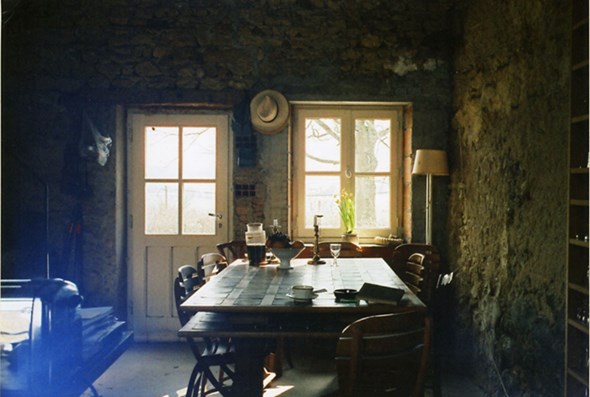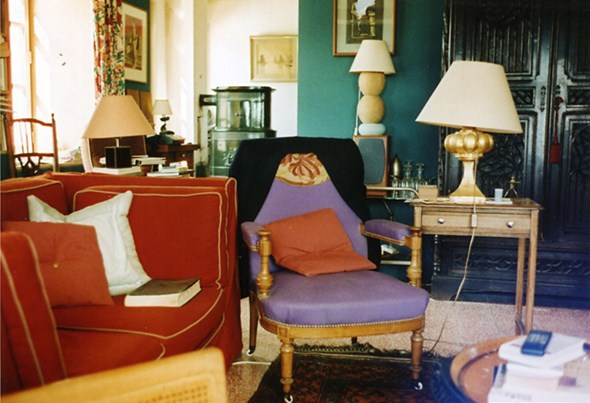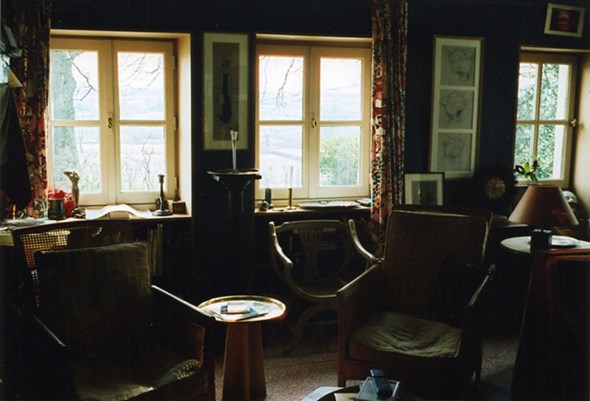
What is reading? One memory is played out against another. In a Viennese coffee-house the artist, DJ, and critic CHRISTIAN EGGER meets the German painter AMELIE VON WULFFEN. A conversation about Solzhenitsyn, Houellebecq and Kippenberger, about non-systematic reading and the everyday life of the artist.
Christian Egger:
As an artist you work very much as a story-teller. What significance does literature have for your work?
Amelie von Wulffen: It’s not easy to answer that directly, but it is true that in my exhibitions there is often something like a flow of text or a sequence of illustrated objects and associations. There are also direct references to literature, such as the portraits of Alexander Solzhenitsyn. In part, that has something to do with my family, who had associations with dissidents from the former Eastern Bloc. As a child I met artists and intellectuals from the Soviet Union. Solzhenitsyn was not one of them, but that’s something one read at that time, he was a figure who embodied the Russian resistance most powerfully.
Did you always live in the West?
Yes. Those associations came through my grandparents, who were from Bohemia, more or less driven out. They were writers, poets really, and in the late 1960s and 1970s they made a point of inviting persecuted writers from the Soviet Union and East Germany to the West, to protect them from being attacked by the state. Nowadays the entire history of dissidence back then plays no role at all. And I found it really crass to see how these people eventually lost their significance and their public. In Germany and even more in America they had an incredibly high status because they were also honoured and turned into instruments as anti-Communist resistance fighters.
When I visited New York and then Moscow for the first time in 2002, I discovered that Moscow was far ahead in matters of capitalism and even with regard to the range of goods. It seemed more like the city where there is nothing you can’t have. I was surprised to get Takeshi Kitano films in an ordinary supermarket and coffee-and-beer mixed drinks …
Interesting, fifteen years ago it was still difficult to get butter, milk or coffee.
An astonishing personality who always comes to my mind in association with Russia and whose satirical-grotesque work only found a wider public after his wretched death from starvation in 1942 is Daniil Kharms. Does that name mean anything to you?
Don’t know him; I’ve read lots of Dostoyevsky, Gogol, Lermontov, Gontsharov, Bulgakov, Aimatov.
Do you find that, because of your profession, reading automatically becomes research?
Actually it’s usually exactly the opposite. For me reading is more the other thing, the relaxing thing, and the non-targeted purposive thing. There is no system in what I read and why. I am rather slow with regard to theory and hardly ever read a book right through to the end. This reminds me of a good modern art-history book: »Jack Goldstein and the CalArts Mafia«, do you know it?
I’ve heard of it.
A lot of people I know have read it recently. That’s an entertaining, good way to report on an art scene, how it came about and went on developing, mixed with statements by people who were part of it. It’s not only about the artworks but also very much about the people involved, their ways of life and personal motives.
Oral history? That sort of thing is usually swallowed quickly.
Yes, lively and also quite crude, what you find out about how tough they all were and how ambitious and competitive. It makes you think we’re living in paradise these days. In particular, Jack Goldstein himself ruined his own life, he was madly paranoid and ambitious and was always posing – there was nothing normal about him anymore. On the other hand, of course, it is possible to get huge amounts of energy from paranoia. Many from that scene apparently suffered a lot from each other and from career pressure, and it was all about money. David Salle and consorts, they earned a hundred times as much as people like us. And there were fewer artists, less room …
You see some of that in Chris Kraus as well, the art world as …
... something very unpleasant. It’s interesting that you mention her, I read two books by her recently. You can get a lot of insider knowledge from them about the art and theory scene of the 1990s in New York, Los Angeles, Berlin and Paris. I recently heard the criticism that her feminism is old-fashioned. I can’t understand that. I think it is totally realistic and its analysis is as clear as glass, the way she sees her art production in this male world of theory, how the power situation is also reflected in her own desires, the constant put-down she has to deal with. And the way she opens up her relationship to Sylvère Lotringer inTorpor: very complex and very clear-headed and serene, and yet without bitterness. As a portrait of a modern relationship in the art or intellectual milieu that is really brilliant. I was totally enthusiastic about her books I Love Dick and Torpor, it’s absolutely fantastic: In the first place, they are very well written and I find that this mixture of intellectuality, feminism with a simple, direct gift of observation and the unrelenting descriptions of herself are very resourceful, entertaining but illuminating literature. In I Love Dick I find it amusing how it gets going and how madly she behaves and yet how easy it is to understand all that. These letters to »Dick« […], and that Lotringer ultimately also went along with it.
I haven’t read it, I’m afraid, but I heard that the sociologist Dick Hebdige is also one of the real models in the book?
Yes, that’s right, I don’t know him as a writer. Do you know him?
Only as a path-breaker for Cultural Studies.
Apparently he wanted to have the book banned, which I think shows that he has no sense of humour, because he doesn’t come out badly at all. Basically, he is just the screen for her to project her desires onto. In the book she exposes herself and the circumstances and not so much him. You can understand that she hangs onto these heroic, monomaniac, self-confident men, because she has no chance by herself of getting into a similar position. And so apparently there is nothing else for her but to get fanatically in love. I think another reason these two books are interesting is that we assume that everything happened just like that and that she is just a little bit indiscreet, a bit like reading Bunte magazine [German gossip magazine], only set in a more interesting mileu. And I have never understood why there is so much silence over such things. That’s a concept of discretion that I can’t go along with. Of course there are limits, but in general it is often productive and liberating to lay things out in the open … At the same time, of course, as an author one has incredible power to expose things, like Thomas Bernhard for example, and I wouldn’t want to have come in front of his sights.
Perhaps there is a tendency for all those great experts in the field of theory to hide behind the œuvre?
Yes, for sure. Especially men. Not only in theory but in literature as well, it’s unusual for them to reveal anything about themselves. I think women often write more openly and more autobiographically and make themselves part of the debate. There’s been a sort of personal, autobiographical affair in our family as well. In the 1950s, my grandmother had a close and romantic relationship for some years with Martin Heidegger, and there is quite a large correspondence, which is still under lock and key, however. She has ordered that it can be read only after thirty years.
After her death?
Yes, and that is her right, of course. But more generally I have the impression that some of what surrounds it all is being pre-sorted and cleaned up; for example Elfriede Heidegger demanded a large part of his letters back and destroyed them. It is certainly often the case that the descendants put everything in order, the way they want it to be seen, especially in Germany. And to some extent it’s understandable. I experienced it once myself, for example, when a good friend of mine killed himself and I had written a lot of letters to him shortly before that, completely unfiltered, about how I experienced my artistic surroundings at that time […] I didn’t always say friendly things, you can be sure of that. And now I know that people, friends and artists as well, are coming into his apartment in London and sorting through his things, and all the things I wrote are becoming semi-public.
Was that Josef Kramhöller?
Yes, that’s right.
But what is the case with the transient short-lived everday news messages as SMS and e-mails today?
For us it’s going to be the other way around. All that SMS and e-mail rubbish is will soon be gone. When we die probably no-one will print out our e-mails. And so we are going to leave nothing behind for people to decide whether it is too embarrassing, private or politically incorrect –, simply nothing.
Just enigmas?
Not even that. No-one will ask about that, we will simply be gone. Even our picture and art archives will dissolve.

Let’s get back to literature!
We mentioned Thomas Bernhard briefly a moment ago, but here he is such a giant that I suppose one has to be careful.
Absolutely. That he was an important lesson part of the syllabus at school.
Those three early novels …
Exactly, those three of his five autobiographical novels!
Die Ursache, Der Keller, Der Atem. I was very impressed by them, and after that I read almost all his books within a year. But now, with a little distance, I don’t want that anymore, all that complaining, and always about other people.
When irritation becomes a style – I’ve no idea from what point that starts to determine the writing entirely. Perhaps that is why it’s quite good to focus on art, so as not to be constantly confronted with all that Austrianness.
… or go abroad! But Bernhard has lots of fans in Germany as well. For them Austria is not the main subject but rather they identify with the ill-humoured man. All those who are depressed and find everything just too stupid can agree on that.
Michel Houellebecq covers that as well.
But Bernhard is more OK politically. Houellebecq is a very good storyteller, but his last book, The Possibility of an Island, begins with so much misogynism that I couldn’t go on reading. The way he stupidly and lovelessly devalues women who are bit older – that is really depressing. Bernhard is bad tempered and he shows it, but Houellebecq takes such adolescent pleasure in cheap provocation that it gets on my nerves. In Germany Joachim Lottmann is trying to be more or less the same kind of figure. Have you read anything by him?
Only one of his later works, Jugend von heute, where he did some of his research in Vienna, as I later found out.
That was actually an intelligent and amusing book. He has a lot of sworn enemies and yet he has a lot of success at present as well, and writes big articles for Spiegel. I heard that he committed some incredibly indiscrete slips in the late eighties1980s, in Tempo and elsewhere. … until finally nobody wanted to have anything to do with him.
He started in an art context.
Yes, Josef Strau, for example, knew him quite well for a while, as he told me. He lived with him in Cologne for a short while and Lottmann gave him some tips about how to pick up women, very crudely and directly and that seems to have worked surprisingly well. Well, as I say, I found Jugend von heute quite good, but the next book, Zombie Nation, was an awful on-and-on story … What is irritating about him is his latent sexism. On the other hand, he doesn’t try to sugarcoat things and reveals it openly. And it’s interesting that he has a certain intellectual level, politically and historically. A lot of young German writers don’t have that, there is so much inwardness. Just now I am reading Jörg Fauser’s Rohstoff from 1984 and it seems to be a very good book. It is a typical autobiographical first novel, about a young writer, subculture scenes and drugs, and it conveys quite densely an atmosphere of 1970s Germany that is both very tough and yet extremely romantic. It starts in Istanbul, where he is still a total junkie, and then it passes through various love affairs, cities and scenes. This makes it very interesting, because you can really put yourself into Germany of the late 1970s; it’s very dense in atmosphere, I would say. He is also a bit macho, the lone tough wolf – especially in his crime stories, but that belongs to the genre somehow.
Maybe Charles Bukowski was a model.
I think he was more focused on William Burroughs, in any case he mentions him more often.
I can’t really see Burroughs as such a big macho.
What? First of all, he shot his wife because he was drunk and put an apple on her head to play William Tell ... that’s totally stupid. And apart from that he was a typical dandy, who only talked with men and had absolutely no women on his roadmap.
We were talking about Brinkmann, Lottmann and Fauser. This is turning more and more into a sort of salon chatter.

Gisela Elsner, does she mean something to you?
No, right now she says nothing at all.
She wrote her first books at the end of the 1960s, Berührungsverbot is a well-known one. Then she died alone as a communist and the path from successful writer to someone avoided by publishers sounds very hard.
That reminds me of Irmgard Keun. She was very successful with The Artificial Silk Girl before the Second World War. Apparently that is read in German schools, but I had never encountered it before. Recently I read this early novel of hers, which she wrote in her mid-twenties; it’s pretty direct, thoroughly coarse and sexualised. It’s hard to believe that it was written in Germany in the 1930s and in such a great language. Totally rough-and-ready Berlin dialect. That could have been written in the 1980s or 1990s as feminist punk or chick-lit. I came across her in a book about Josef Roth, who once had an affair with her. The memoirs of Josef Roth, Der heilige Trinker, were very interesting for me because you could get some idea of what all that was going on had already existed in the 1920s, a totally bohemian milieu, how modern it was, it seems almost familiar, and then it all disappeared. Roth is an Austrian really, isn’t he? Boy, he was quite crazy, living in hotels and pubs, drinking incredible amounts, going to meetings of conspiracies to reintroduce the monarchy to Austria. Some things about him reminds me of Kippenberger, all that going out, drinking, talking with people, telling funny stories.
There are many books coming out about Kippenberger currently, by one of his sisters, for example. I get the impression that some monotonous myth-making is going on with the Kippenberger trademark.
He’s extremely important and interesting, but I’m beginning to have enough as well, and I don’t have to follow every detail. I don’t get so much out of concerning myself with every detail of his humour. I saw him from a distance a few times when I was fairly young, I mean I was at a few openings where he told jokes in a loud voice, and I got some impression of the kind of personality he was. As a woman I experienced the whole scene in those days as pretty intimidating. The way I saw that as a woman in those days: I found the whole scenery quite intimidating. Kippenberger once said to me »Well, just look, what a sweet thing …«. That sounds quite nice at first, but was really a very hard scene, where, if possible, you had to shout very loud and tell jokes and there were very few women who were allowed to take part in all the talk. At best one could become the girlfriend of one of the men. There was a separate scene for mistresses, it seemed to me, and the ones who wanted to be seen as artists were probably all alcoholics or became that. This business of »you have to shout« and »you have to be funny« and »stand on the table« and all that madness. Terrible. That might sound a bit up-tight now and a bit super-feminist of me. But at that time I really didn’t want to be an artist in that scene. People shouldn’t forget that when they start idealising Kippenberger.
Thank you for this conversation.
Translated by Nelson Wattie
Photos: Amelie von Wulffen
CHRISTIAN EGGER is an artist and critic and lives in Vienna.
AMELIE VON WULFFEN, born in 1966 in Breitenbrunn, Germany. Since 2006 professorship at the Academy of Fine Arts, Vienna. Lives and works in Berlin. Numerous international exhibitions and participations including Made in Germany, Sprengel Museum Hannover (2007), Kunstverein Düsseldorf (2006), Museum für Gegenwartskunst, Basle (2005), Centre Georges Pompidou, Paris (2005), Kunstverein Braunschweig, Manifesta 5 (2004), Berlin Biennial (2004).
